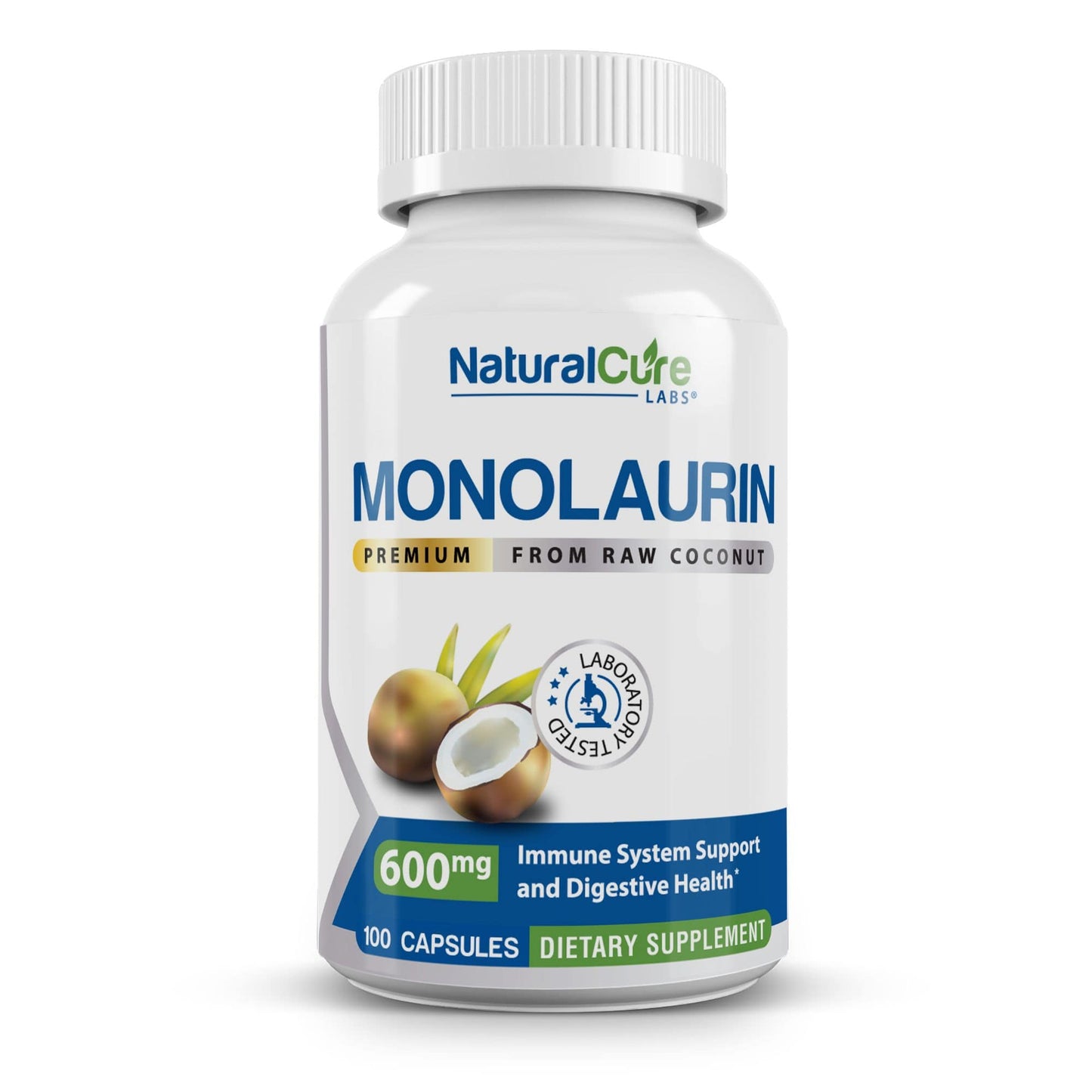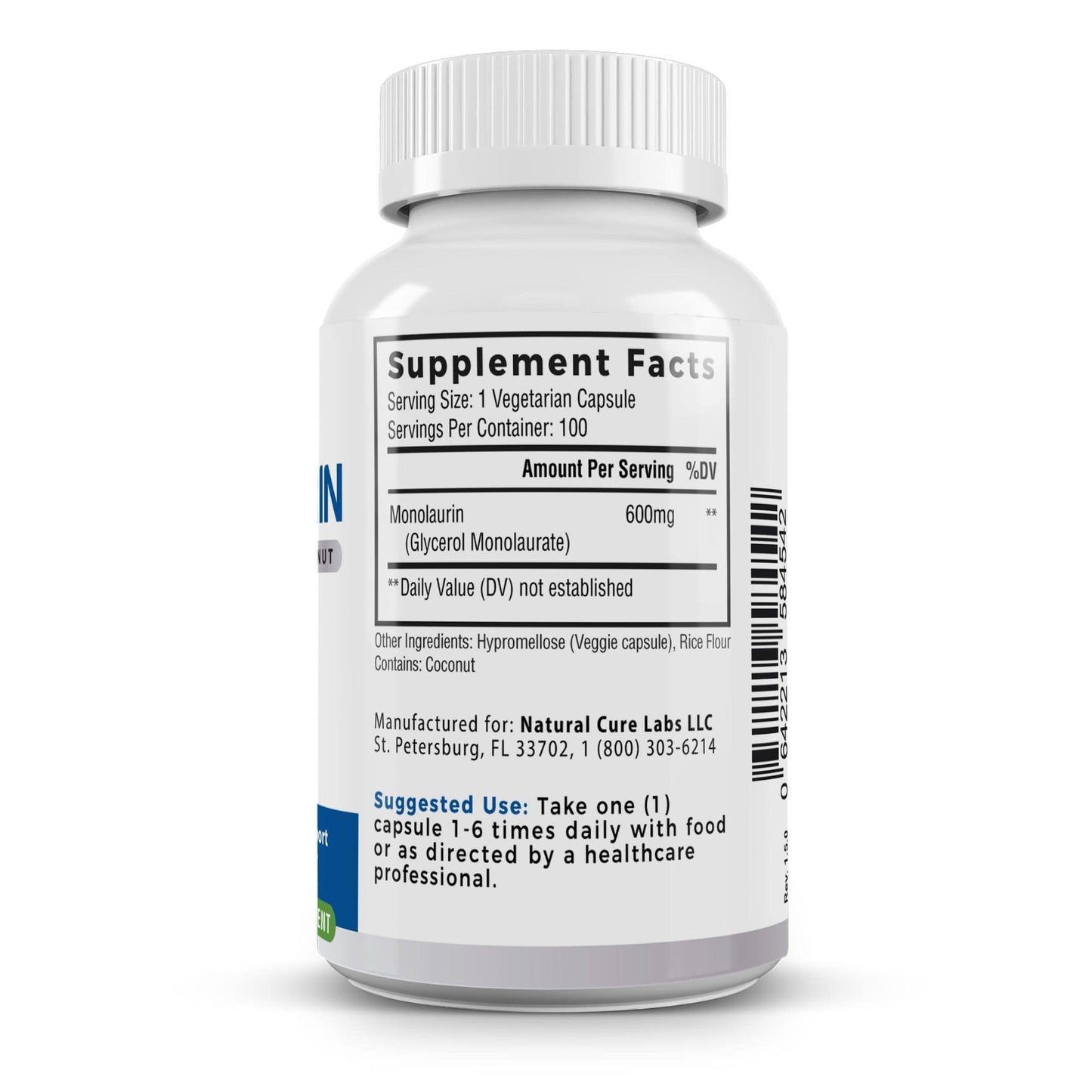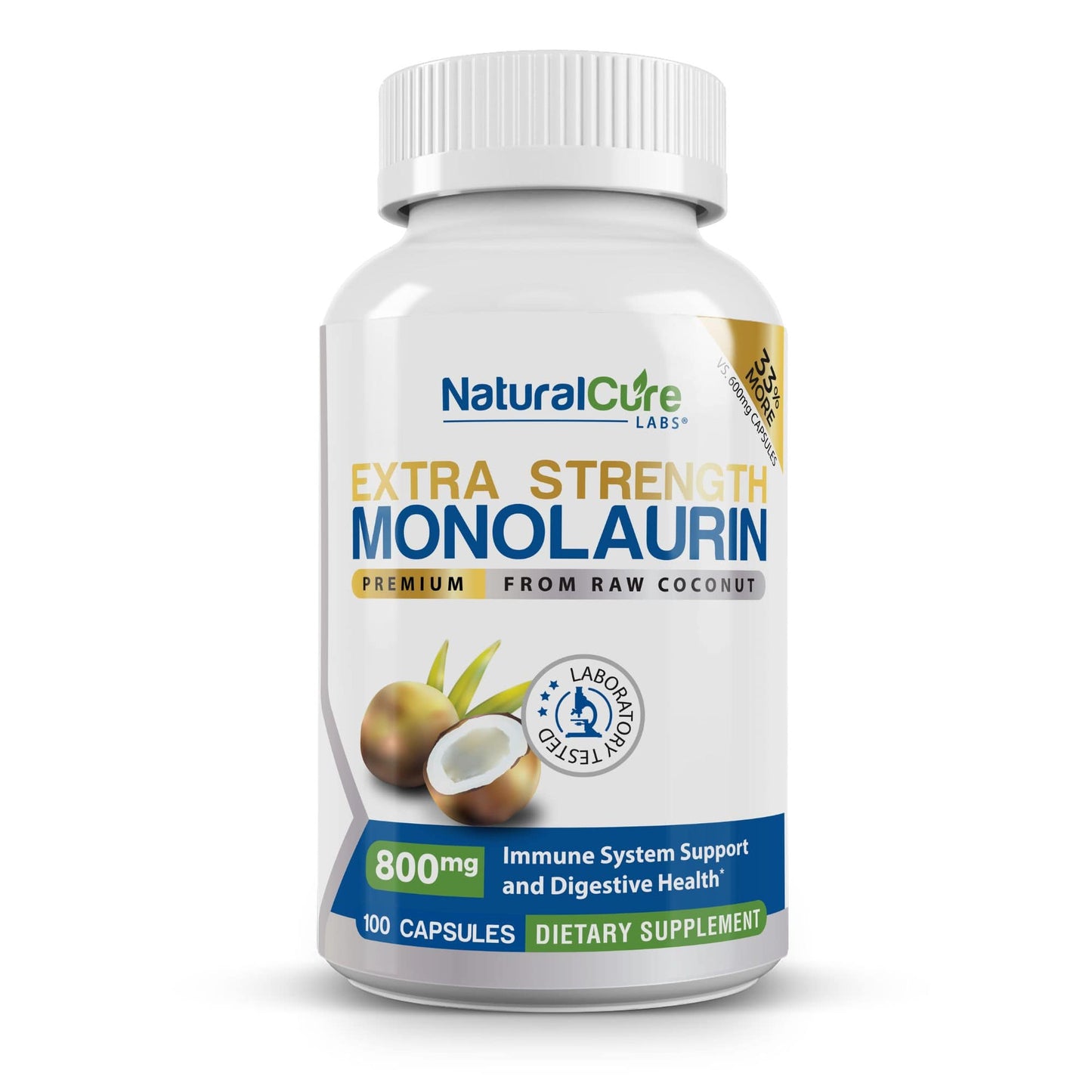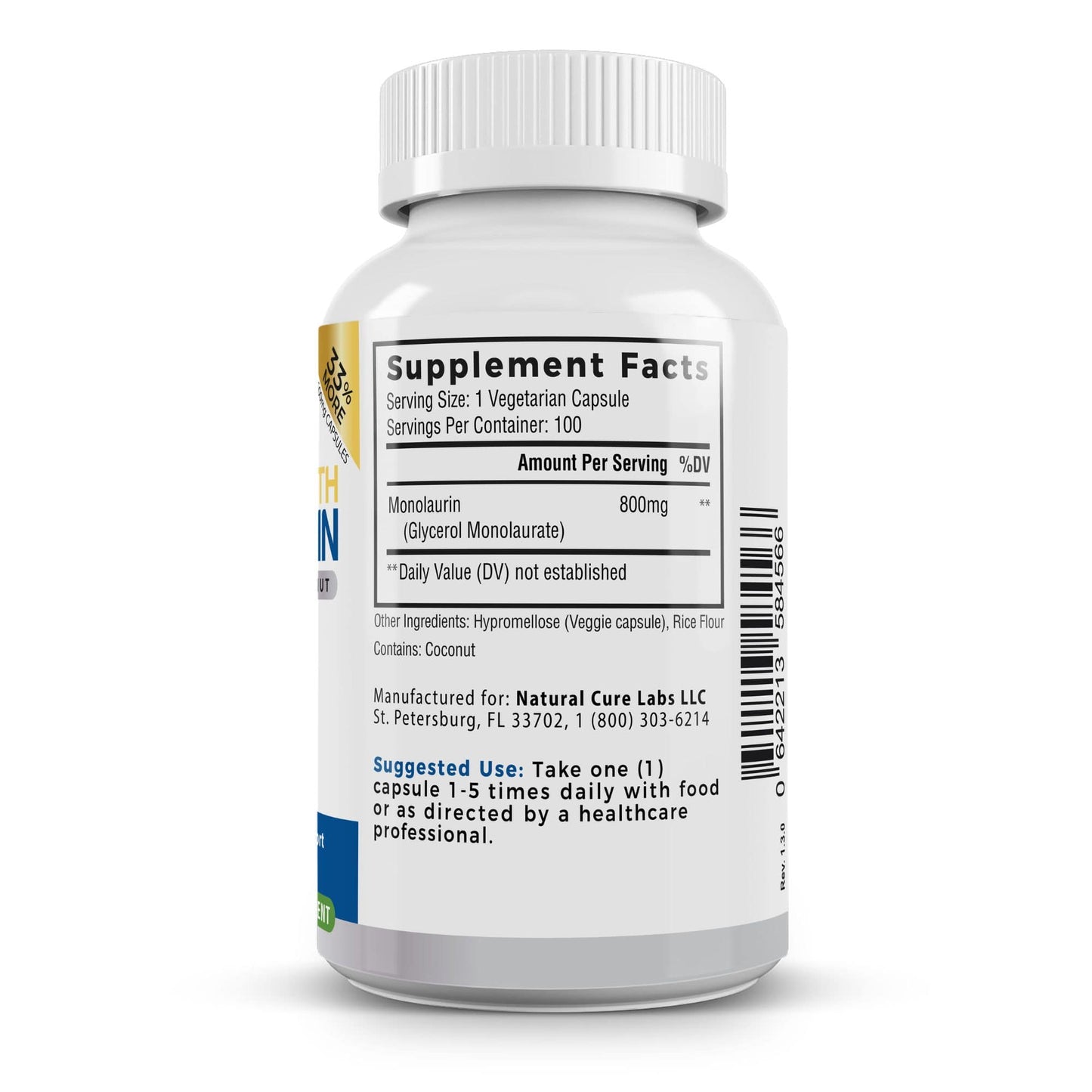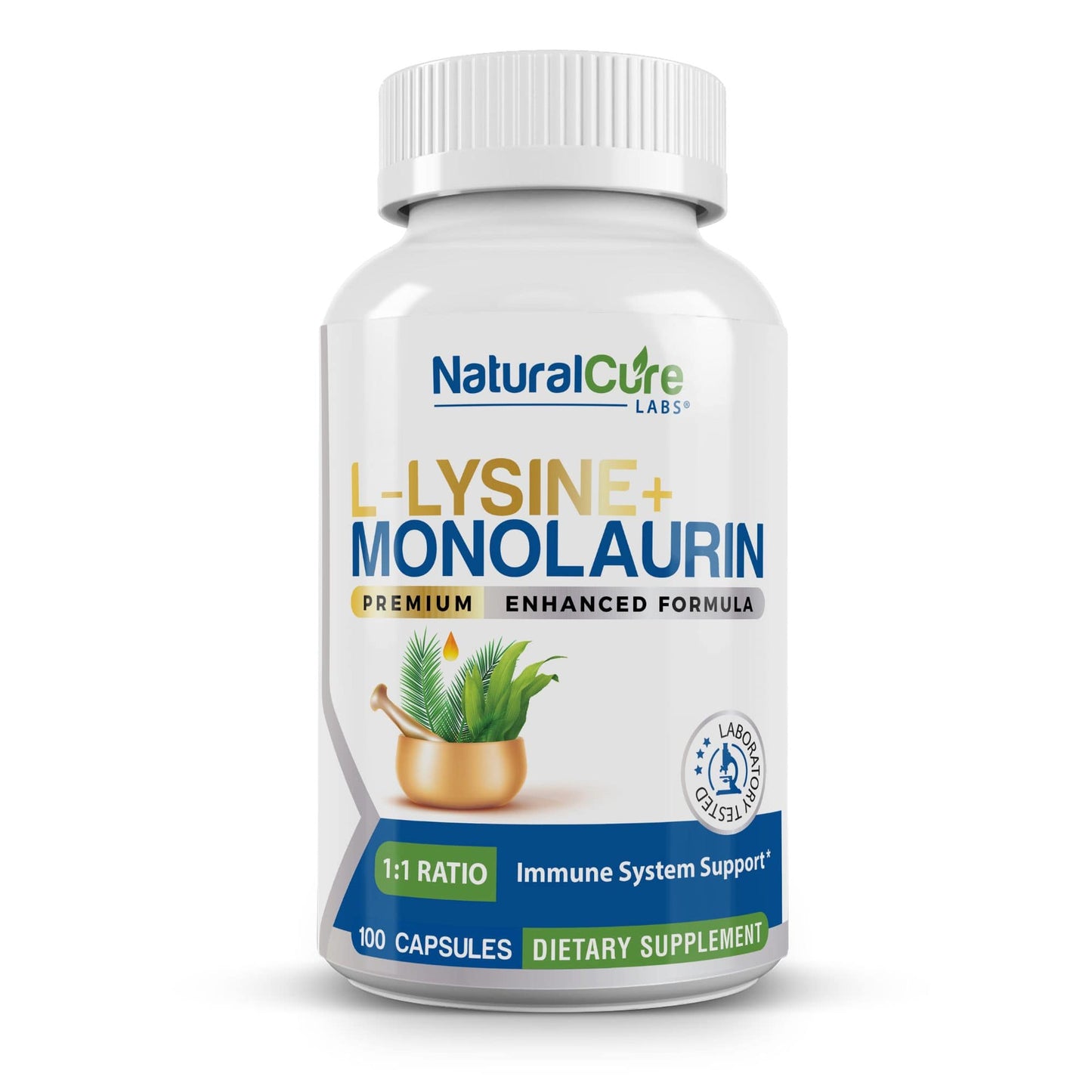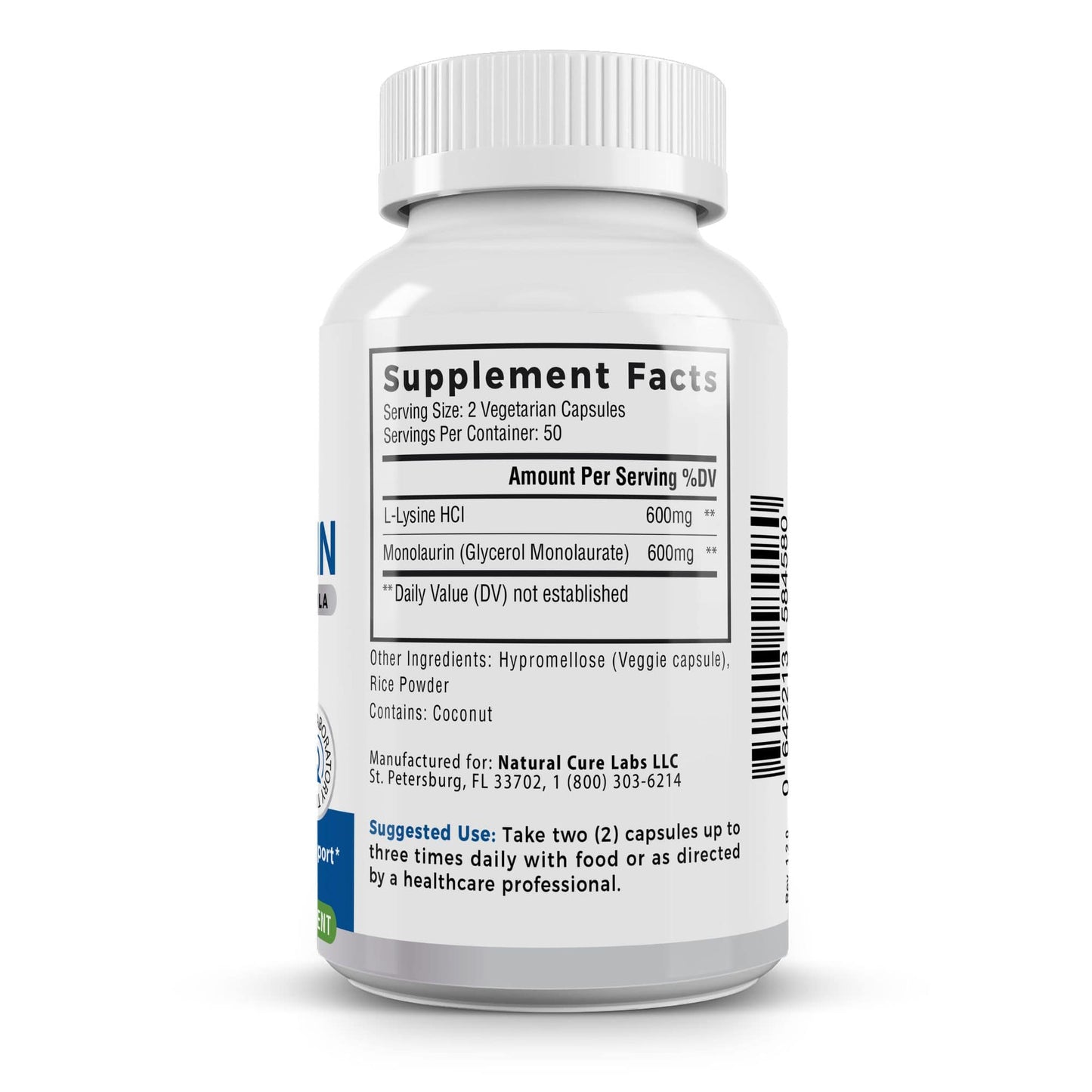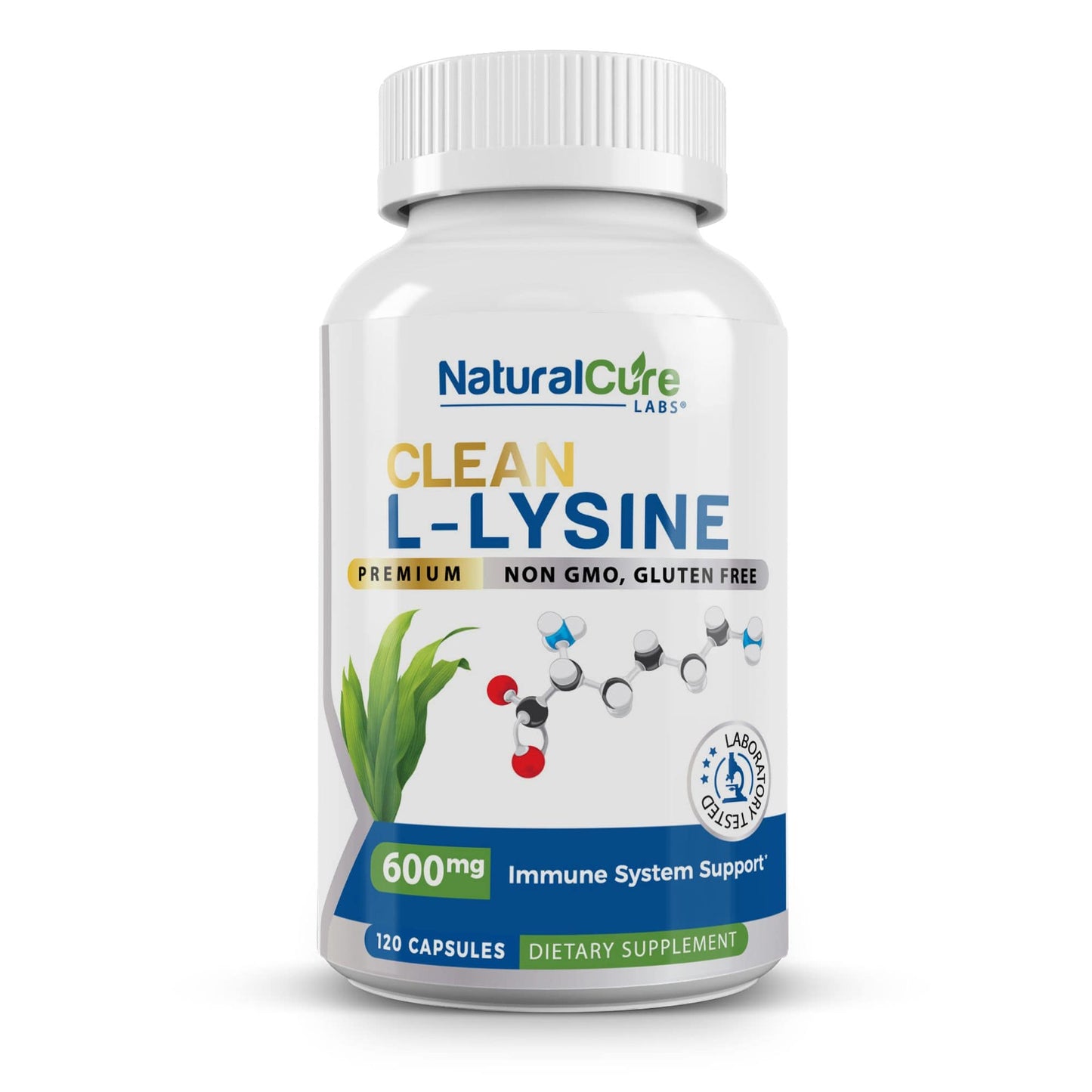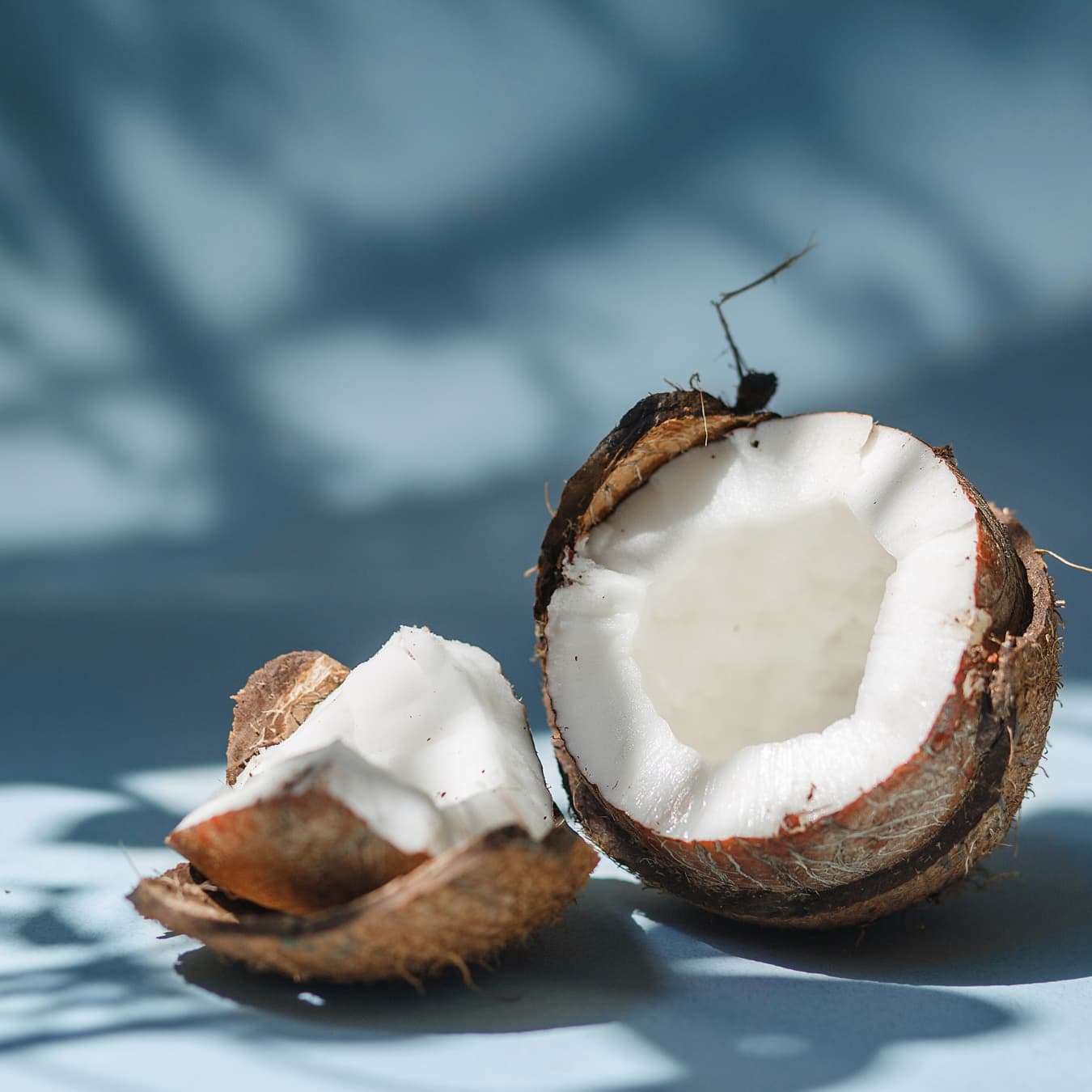
📝 Medically reviewed by Dr. Patricia Shelton
🔍 Last updated April 29, 2024
📚 21 citations
📖 8 minute read
About the Author:

Dr. Patricia Shelton, MD, has been a medical communicator and educator since 2014. She holds a Doctor of Medicine degree and a Bachelor's degree in Neuroscience, both from the University of Washington in Seattle.
--
Coconut oil is a versatile plant-based compound with a variety of potential health benefits. Used in everything from skin-smoothing body lotions to kitchen cooking oils, the power and potential of coconut oil seem primarily to stem from its high lauric acid content.
Coconut oil, lauric acid, and, in turn, monolaurin have been shown to potentially support immune health and enhance digestive function.‡ If you don't already take monolaurin-based dietary supplements, now is the time to consider enhancing your wellness routine with this plant-based oil. ‡
Jump To:
Keep reading to learn more about the potential wellness benefits of coconut oil.
See Related: What Is L-Lysine Good For? Uses, Benefits, And More
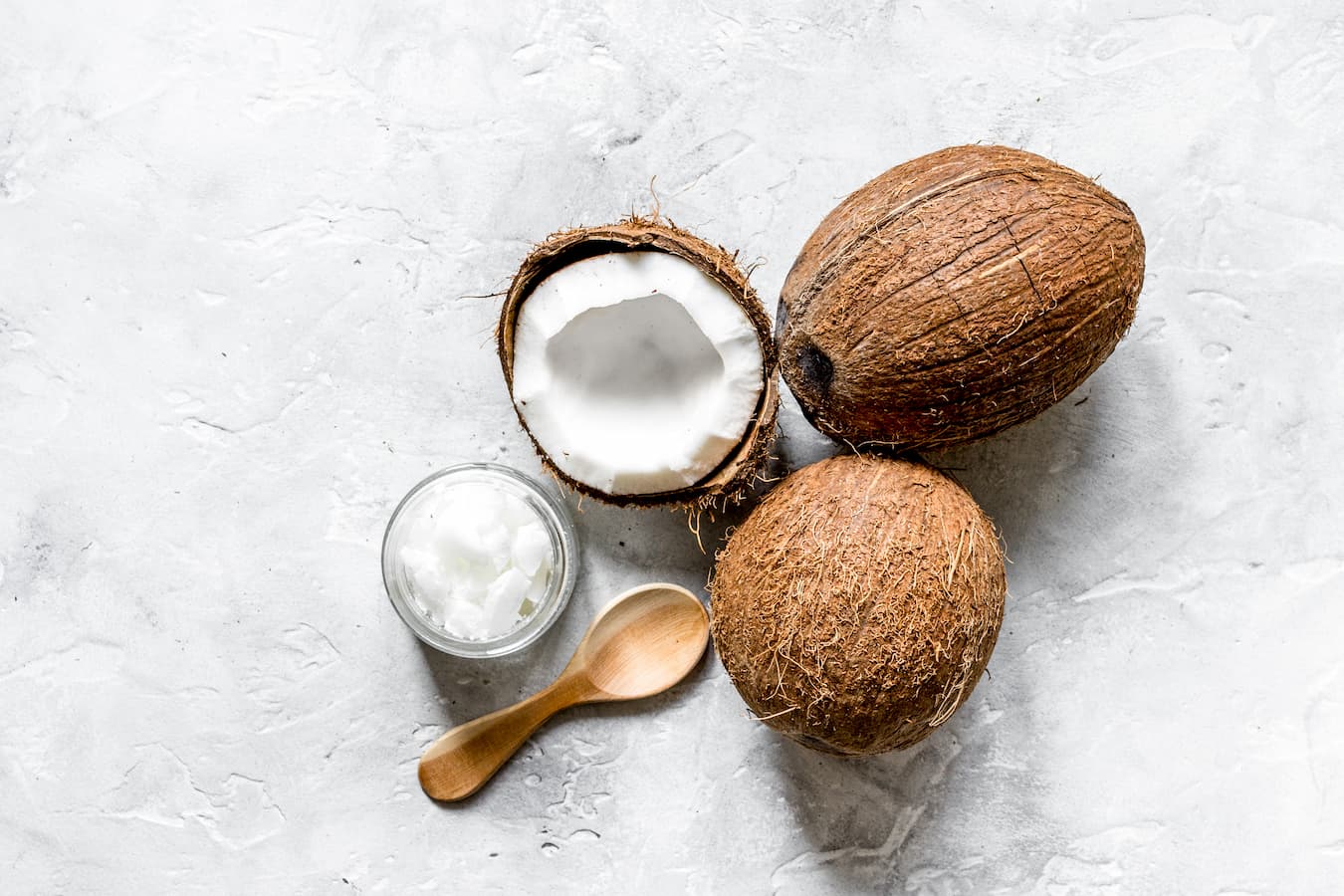
What is Coconut Oil?
Coconut oil is an edible oil that is a solid at room temperature and melts with slight heat. There are two types of coconut oil: virgin coconut oil, which is made by pressing fresh coconut meat, and refined coconut oil, which is created with copra (dried coconut meat). ¹
Many use coconut oil in cooking as a healthier alternative to highly refined and processed vegetable oils like soybean or canola oil.
Depending on the grade, coconut oil can be used in baking, sautéing, and even frying. It's a true kitchen staple! Of course, if you decide to use coconut oil in your daily diet, be sure to consume it in moderation.
However, that's not the only way you can use coconut oil. Because it has moisturizing properties, it's often incorporated in lotions and hair care products.
What is Monolaurin?
50% of the fats in coconut oil are medium-chain fatty acids (MCFAs), which include lauric acid. Monolaurin is a compound derived from lauric acid. Because coconut oil is one of the richest natural sources of lauric acid, it may also be a great source of monolaurin, although the rate at which the body converts lauric acid to monolaurin is unknown. Monolaurin has been a popular natural product for years. It's often included in health supplements, such as in our Premium Monolaurin capsules. ‡ ²
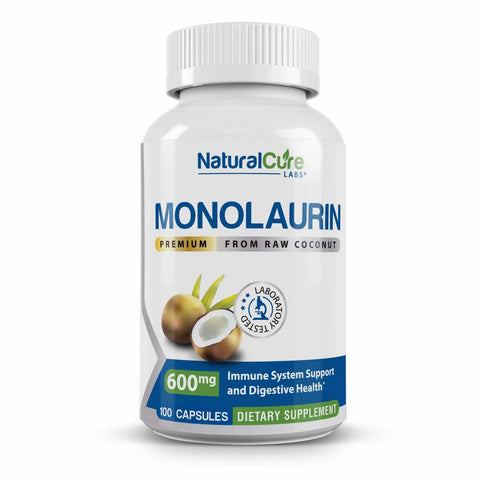
Bonus: 7 Foods To Boost Your Immune System
These botanical-based supplements contain between 600mg and 800mg of monolaurin derived from lauric acid. So, for each two-capsule serving, your body will receive 1,200mg to 1,600mg of high-quality glycerol monolaurate. Plus, this clean-label formula contains no additives like magnesium stearate or silica, so you can rest assured knowing you're giving your immune system only the best. ‡
Some research suggests that monolaurin can support the immune system ³, maintain healthy digestive function ⁴, and support heart health ⁵. ‡ However, that's not all that this monoglyceride can do.
What is Coconut Oil Good For?
Whether you take daily monolaurin health supplements or slather your skin with plant-based lotions, there are many ways to enhance your daily life with the potential benefits of coconut oil.
Keep reading to learn more about how coconut oil can be used to improve your wellness and well-being.
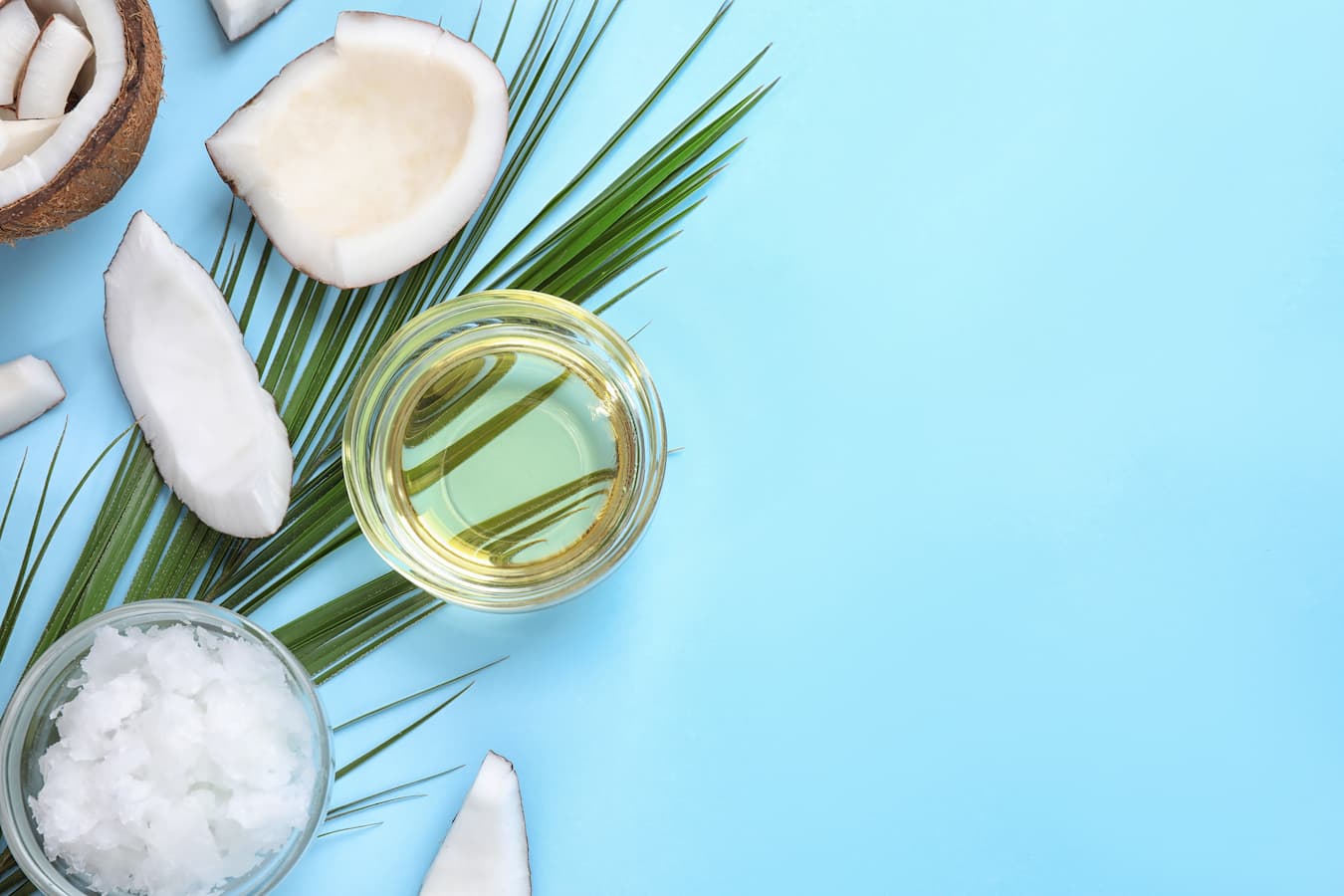
#1. The Monolaurin in Coconut Oil May Support Immune Health ‡
MCFAs make up 65% of the total composition of coconut oil. These fatty acids include lauric acid, which accounts for 49%. ⁶
Using lauric acid, the body can create monolaurin, which research suggests may support a healthy immune response. A strong immune system is critical for overall health, as it helps your body navigate the stresses of everyday life. ⁷ ⁸ ⁹
Your body deserves only the best, which is why plant-based supplements may be a great way to support immune function. A great place to start could include our Monolaurin Extra Strength capsules, a clean formula made with premium botanicals. ‡
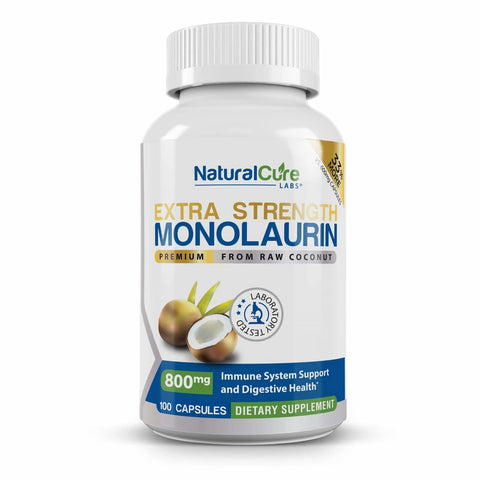
#2. These Medium-Chain Fatty Acids May Maintain Healthy Brain Function ‡
Some studies have shown a potential correlation between brain health and coconut oil. ¹¹ Substances found in coconut oil may act as neuroprotectants, meaning that they protect brain cells from degeneration. ¹⁷ There has also been some research showing that consuming medium-chain fatty acids (MCFAs) may help to provide brain cells with more energy. ¹⁸
#3. Coconut Oil is a Natural Source of Energy ‡
MCFAs are converted by the liver into ketones, which can be used for energy by many cells throughout the body without the need to use insulin to process glucose (blood sugar).¹⁰ This unique process can even result in longer-lasting energy. ¹⁵ ¹⁶
Some studies also show that MCFAs help to improve mitochondrial function. ¹⁹ The mitochondria act to generate energy within a cell, so better mitochondrial function translates to increased energy.
#4. Virgin Coconut Oil May Support Heart Health ‡
Many studies have associated higher levels of HDL cholesterol with a lower risk of heart disease. 20 Studies show that virgin coconut oil consumption has the potential to significantly increase HDL cholesterol levels, unlike nontropical vegetable oils. ¹³ ¹⁴
#5. It Can Support Gut Health ‡
Coconut oil may support digestive function, especially when taken in conjunction with omega-3 fatty acids. Research shows that coconut oil may support a healthy balance of gut bacteria. ⁴ The balance of bacteria in the gut has been found to influence many different aspects of physical as well as mental health. ²¹
Final Thoughts
If you're ready to support immune function and maintain your overall well-being, coconut oil may be the way to go. This plant-based oil is high in lauric acid, which converts to monolaurin in the body, so you can enjoy benefits that are hard to come by otherwise! ‡
Keep Reading: What Are Lymph Nodes And What Do They Do?
--
References
- Wallace T. C. (2019). Health Effects of Coconut Oil-A Narrative Review of Current Evidence. Journal of the American College of Nutrition, 38(2), 97–107. https://doi.org/10.1080/07315724.2018.1497562
- Boateng, L., Ansong, R., Owusu, W. B., & Steiner-Asiedu, M. (2016). Coconut oil and palm oil's role in nutrition, health and national development: A review. Ghana medical journal, 50(3), 189–196.
- Witcher, K. J., Novick, R. P., & Schlievert, P. M. (1996). Modulation of immune cell proliferation by glycerol monolaurate. Clinical and diagnostic laboratory immunology, 3(1), 10–13. https://doi.org/10.1128/cdli.3.1.10-13.1996
- Rial, S. A., Karelis, A. D., Bergeron, K. F., & Mounier, C. (2016). Gut Microbiota and Metabolic Health: The Potential Beneficial Effects of a Medium Chain Triglyceride Diet in Obese Individuals. Nutrients, 8(5), 281. https://doi.org/10.3390/nu8050281
- Sekhar, S., Makaram Ravinarayan, S., Kashmer D Yu, A., Kilic, F., Dhawan, R., Sidhu, R., Elazrag, S. E., Bijoora, M., & Mohammed, L. (2022). Are We Nuts Over Coconuts? Studying the Effects of Coconut Oil on Low-Density Lipoprotein and Cardiovascular Diseases: A Systematic Review. Cureus, 14(4), e24212. https://doi.org/10.7759/cureus.24212
- DebMandal, M., & Mandal, S. (2011). Coconut (Cocos nucifera L.: Arecaceae): in health promotion and disease prevention. Asian Pacific journal of tropical medicine, 4(3), 241–247. https://doi.org/10.1016/S1995-7645(11)60078-3
- Shilling, M., Matt, L., Rubin, E., Visitacion, M. P., Haller, N. A., Grey, S. F., & Woolverton, C. J. (2013). Antimicrobial effects of virgin coconut oil and its medium-chain fatty acids on Clostridium difficile. Journal of medicinal food, 16(12), 1079–1085. https://doi.org/10.1089/jmf.2012.0303
- Joshi, S., Kaushik, V., Gode, V., & Mhaskar, S. (2020). Coconut Oil and Immunity: What do we really know about it so far?. The Journal of the Association of Physicians of India, 68(7), 67–72.
- Nicholson L. B. (2016). The immune system. Essays in biochemistry, 60(3), 275–301. https://doi.org/10.1042/EBC20160017
- Norgren, J., Sindi, S., Sandebring-Matton, A., Kåreholt, I., Daniilidou, M., Akenine, U., Nordin, K., Rosenborg, S., Ngandu, T., & Kivipelto, M. (2020). Ketosis After Intake of Coconut Oil and Caprylic Acid-With and Without Glucose: A Cross-Over Study in Healthy Older Adults. Frontiers in nutrition, 7, 40. https://doi.org/10.3389/fnut.2020.00040
- de la Rubia Ortí, J. E., García-Pardo, M. P., Drehmer, E., Sancho Cantus, D., Julián Rochina, M., Aguilar, M. A., & Hu Yang, I. (2018). Improvement of Main Cognitive Functions in Patients with Alzheimer's Disease after Treatment with Coconut Oil Enriched Mediterranean Diet: A Pilot Study. Journal of Alzheimer's disease : JAD, 65(2), 577–587. https://doi.org/10.3233/JAD-180184
- Hayek, T., Ito, Y., Azrolan, N., Verdery, R. B., Aalto-Setälä, K., Walsh, A., & Breslow, J. L. (1993). Dietary fat increases high density lipoprotein (HDL) levels both by increasing the transport rates and decreasing the fractional catabolic rates of HDL cholesterol ester and apolipoprotein (Apo) A-I. Presentation of a new animal model and mechanistic studies in human Apo A-I transgenic and control mice. The Journal of clinical investigation, 91(4), 1665–1671. https://doi.org/10.1172/JCI116375
- Chinwong, S., Chinwong, D., & Mangklabruks, A. (2017). Daily Consumption of Virgin Coconut Oil Increases High-Density Lipoprotein Cholesterol Levels in Healthy Volunteers: A Randomized Crossover Trial. Evidence-based complementary and alternative medicine : eCAM, 2017, 7251562. https://doi.org/10.1155/2017/7251562
- Neelakantan, N., Seah, J. Y. H., & van Dam, R. M. (2020). The Effect of Coconut Oil Consumption on Cardiovascular Risk Factors: A Systematic Review and Meta-Analysis of Clinical Trials. Circulation, 141(10), 803–814. https://doi.org/10.1161/CIRCULATIONAHA.119.043052
- Wang, B., Li, L., Fu, J., Yu, P., Gong, D., Zeng, C., & Zeng, Z. (2016). Effects of Long-Chain and Medium-Chain Fatty Acids on Apoptosis and Oxidative Stress in Human Liver Cells with Steatosis. Journal of food science, 81(3), H794–H800. https://doi.org/10.1111/1750-3841.13210
- Valente, F. X., Cândido, F. G., Lopes, L. L., Dias, D. M., Carvalho, S. D. L., Pereira, P. F., & Bressan, J. (2018). Effects of coconut oil consumption on energy metabolism, cardiometabolic risk markers, and appetitive responses in women with excess body fat. European journal of nutrition, 57(4), 1627–1637. https://doi.org/10.1007/s00394-017-1448-5
- Mansouri, E., Asghari, S., Nikooei, P., Yaseri, M., Vasheghani-Farahani, A., & Hosseinzadeh-Attar, M. J. (2024). Effects of virgin coconut oil consumption on serum brain-derived neurotrophic factor levels and oxidative stress biomarkers in adults with metabolic syndrome: a randomized clinical trial. Nutritional neuroscience, 27(5), 487–498. https://doi.org/10.1080/1028415X.2023.2223390
- Jensen NJ, Wodschow HZ, Nilsson M, Rungby J. Effects of Ketone Bodies on Brain Metabolism and Function in Neurodegenerative Diseases. Int J Mol Sci. 2020 Nov 20;21(22):8767. doi: 10.3390/ijms21228767. PMID: 33233502; PMCID: PMC7699472.
- Montgomery, M. K., Osborne, B., Brown, S. H., Small, L., Mitchell, T. W., Cooney, G. J., & Turner, N. (2013). Contrasting metabolic effects of medium- versus long-chain fatty acids in skeletal muscle. Journal of lipid research, 54(12), 3322–3333. https://doi.org/10.1194/jlr.M040451
- Cho, Y. K., & Jung, C. H. (2021). HDL-C and Cardiovascular Risk: You Don't Need to Worry about Extremely High HDL-C Levels. Journal of lipid and atherosclerosis, 10(1), 57–61. https://doi.org/10.12997/jla.2021.10.1.57
- Hills, R. D., Jr, Pontefract, B. A., Mishcon, H. R., Black, C. A., Sutton, S. C., & Theberge, C. R. (2019). Gut Microbiome: Profound Implications for Diet and Disease. Nutrients, 11(7), 1613. https://doi.org/10.3390/nu11071613
‡ These statements have not been evaluated by the Food and Drug Administration. This product is not intended to diagnose, treat, cure, or prevent any disease.
--
Natural Cure Labs provides dietary supplements made from naturally derived ingredients. Our research-backed products contain premium botanicals and antioxidants that encourage healthy living and holistic wellness. Each high-quality product comes with a Clean Label that certifies our commitment to quality, transparency, and research. To stay connected and learn more, follow us on Facebook, Instagram, and TikTok.

